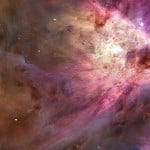 We are experiencing a new Copernican shift that is revolutionizing our spirituality. It is undermining our sense of humanity as something privileged in the universe, the sole possessor of “soul”, standing above the beasts and apart from the inert dust of soil. It is questioning our free will, our magical power to move ourselves amidst the billiard-ball jumble that moves everything else in the universe. Our spirituality will have to change to embrace this new vision of humanity.
We are experiencing a new Copernican shift that is revolutionizing our spirituality. It is undermining our sense of humanity as something privileged in the universe, the sole possessor of “soul”, standing above the beasts and apart from the inert dust of soil. It is questioning our free will, our magical power to move ourselves amidst the billiard-ball jumble that moves everything else in the universe. Our spirituality will have to change to embrace this new vision of humanity.
The old Copernican shift
The heliocentric model of Copernicus showed us that the earth is not the center of the universe, that we are not special but a humble, integrated part of a larger whole called the solar system.
Suddenly, the earth had the same status as any of the other planets, and behaved just like them. This at once undermined both the specialness of the earth as the focal point of the universe, and the specialness of the other planets as exalted, transcendent entities. Both were of the same stuff, and that required a tumultuous shift in spiritual understanding.
The new shift
In just the same way, we are now beginning to understand that the human mind, the psyche, the “soul” even, is not special either. Neuroscience, cognitive psychology, evolutionary biology, organic chemistry, and a host of other lines of research are converging on an inevitable conclusion: we operate according to the same physical laws as everything else in the universe.
Consciousness, thought, emotion, meaning, value – all these are emergent properties of a particular arrangement of organic chemistry.
Just as extreme hardness emerges when carbon atoms assemble in a certain manner to form a diamond, so consciousness emerges when carbon assembles in another manner to form life.
Suddenly our dreams, hopes, and aspirations – all that we hold dear – appear as if at the mercy of chance meetings of molecules. There is a beauty but also a horror to this.
Are we really nothing more than a random coagulation of stuff? Aren’t we special?

We are no more the center of consciousness than the center of the solar system. All the universe partakes of the same essential process of “knowing.”
The special species?
Just as the earth is not the specially-privileged center of the universe, we are not the specially-privileged center of consciousness.
We may be unique on this planet – so far as we can tell, no other species has achieved our level of intelligence or aptitude for complex manipulation of symbols. But we are not special in how this came about. It’s all due to the same fundamental process.
Meaning is not unique to us. Even amoebae detect the effluents of decaying bacteria, and know this means food is near. On an even simpler level, atoms are constantly seeking to acquire a complete set of electrons, and they bond with nearby atoms to acquire them.
There is no conscious intention to do so, but somehow the atom “knows” to do it. This “knowing” is no more than physical laws in operation, yet it is different from human knowing only in the level of complexity and nuance of response.
An atom knows to acquire electrons, an amoeba knows to move in the direction of food, and we know to breathe the precious air that gives us life. We know to circulate blood in our veins, we know to fire the neurons that bring up a certain memory, we know to respond to the caress of a lover with increased heartbeat and burning desire, and we know to pose one possible course of action against another and call up all the relevant social factors in order to decide what to do. We know to recognize patterns in previous experiences, and extrapolate what patterns are likely to continue in what we call the future. We know, finally, that this whole process of acquiring knowledge, ever incomplete, implies that there is and probably always will be more that we don’t know.
In this litany of knowing, there is a clear progression from the simple to the complex, but it is all the same fundamental process. Consciousness creeps in gradually or all of a sudden, but it does not disrupt the essential process of knowing.
Our knowing, then, our thoughts, our dreams, our very experience of being, is not special. It is the knowing of animals, the knowing of plants, the knowing of amoebae, the knowing of carbon atoms, the knowing of all things that partake in this marvelous phenomenon called the universe.
We are not the center of the universe. We are not the center of consciousness. We are not the center of knowing.
Like people in the days of Copernicus, we may perceive this insight as a threat. We may react to it with fear and denial. But if, instead, we can learn to embrace it, we may discover something startling and new.
Toward a new vision
Our spirituality must evolve itself to incorporate this new insight. We are essentially one with our universe. Every entity in the universe is unique and different – there’s no denying that – but at the same time, on a fundamental level, they are the same.
I and my world are a single, seamless whole. Person and place are identical. The world “out there”, and the experience “in here”, are one.
Atoms are our brothers and sisters. All things in the universe behave exactly as we do, and we behave like them. We are at one with all things. We enjoy communion with each and every thing.
How could there be any deeper mystery than this?
Subscribe to The Spiritual Naturalist Society
Learn about Membership in the Spiritual Naturalist Society
__________
The Spiritual Naturalist Society works to spread awareness of spiritual naturalism as a way of life, develop its thought and practice, and help bring together like-minded practitioners in fellowship.
__________
Written by B. T. Newberg.
__________
Originally originally appearing in: Humanistic Paganism

















